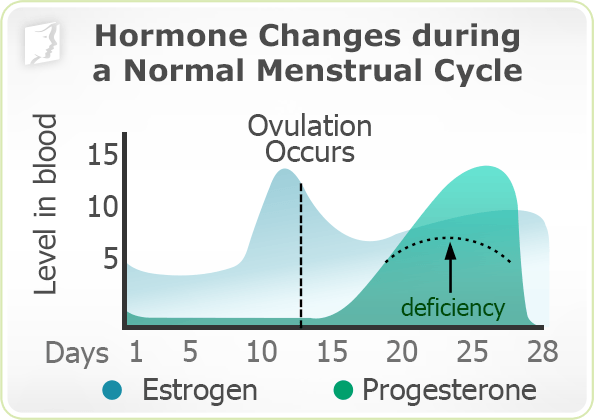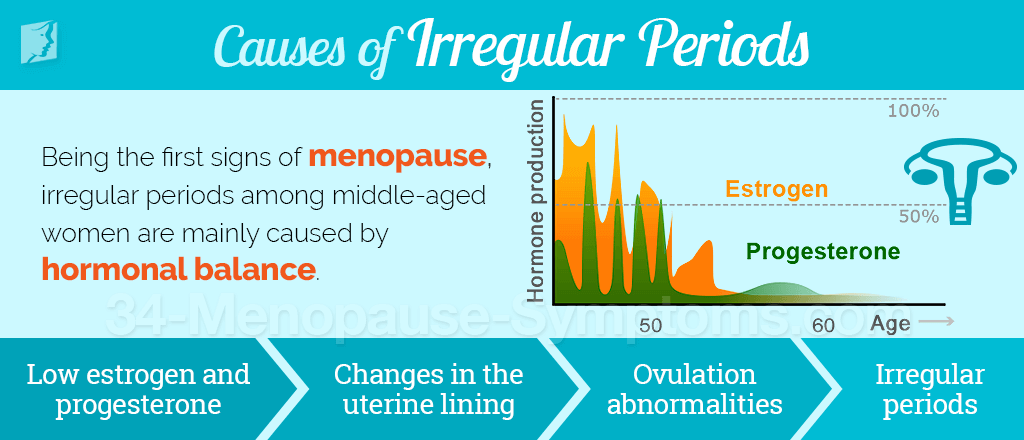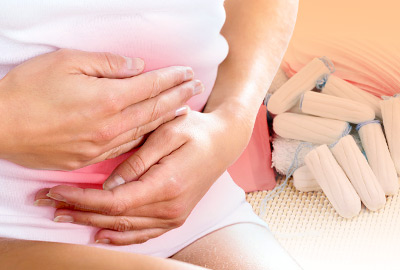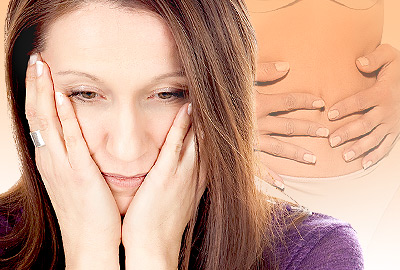Irregular periods are caused by a variety of factors, but for women approaching menopause, the primary cause is hormonal changes in the body. It's important for women who are experiencing irregular periods, a common menopause symptom, to understand what is happening in their bodies.
Besides normal hormonal changes, irregular periods can be caused or aggravated by other physical and lifestyle factors. These underlying causes sometimes warrant a doctor's visit. Continue reading to learn more about the hormonal, health-related, and behavioral causes of irregular periods.
Hormonal Causes of Irregular Periods
Declining levels of estrogen and progesterone in the body are the most common cause of irregular periods during menopause. To better understand this, it is helpful to look at what happens to the hormones in a woman's body throughout her life.
During a regular menstrual cycle, the hypothalamus in the brain sends out a chemical signal - follicle stimulating hormone (FSH) - to the pituitary gland to stimulate follicle development in the ovaries.
Next, these developing follicles secrete increasing amounts of estrogen into the blood, causing the uterine lining to thicken and the cervical mucus to change. When levels of estrogen become high enough, a hormone called luteinizing hormone (LH) is released, and ovulation occurs.
Quick Fact
On average, a women has 500 menstrual cycles throughout her lifetime, between the time of her first period at about age 12 to her last period just prior to menopause.
If the egg isn't fertilized and implanted after ovulation, the levels of estrogen and progesterone drop, the lining of the uterus begins to shed, and a woman has her period, usually 12 - 14 days later.
Birth control pills often block luteinizing hormone and thus prevent ovulation.
The information below outlines the role of hormones during the menstrual cycle.
Role of Hormones during the Menstrual Cycle
While menstruation is orchestrated by many hormones, progesterone and estrogen are the primary ones related to irregular periods.
- Estrogen. Estrogen is responsible for thickening the uterine lining before ovulation. As levels of estrogen become erratic during menopause, this lining is often shed irregularly and can lead to heavy bleeding.

- Progesterone. Progesterone is responsible for triggering the shedding of the uterine lining after ovulation when fertilization hasn't occurred. It is also responsible for controlling the intensity and duration of menstrual bleeding. When it declines during menopause, it can lead to irregular periods.
During menopause, the body begins to produce less estrogen and progesterone, though levels of both hormones fluctuate greatly and are unpredictable. This change in hormone levels often leads to irregular periods. Instead of the spikes in hormones typical of a normal menstrual cycle, the ovaries now produce a consistent low level of hormones, which is not often enough to trigger ovulation.
In addition to these hormonal causes of irregular periods that typically occur during menopause, other physical and emotional factors can cause or aggravate irregular periods in women. Read on to learn more about these other causes of irregular periods.

Other Causes of Irregular Periods
While hormonal changes are the primary cause of irregular periods during menopause, some health conditions and lifestyle triggers can cause or aggravate irregular periods throughout a woman's life. It is important to bear in mind that while the disease-related causes of irregular periods during menopause are rare, they do require medical attention.
Health Conditions
- Eating disorders
- Polycystic ovarian syndrome
- Thyroid dysfunction
- Uterine abnormalities (fibroids, cysts, polyps, endometriosis)
- Irritable bowel syndrome
- Tuberculosis
- Recent birth, miscarriage, or dilation and curettage ("D&C")
- Liver disease
- Diabetes
- Cancer
- Anemia
Lifestyle Triggers
- Significant weight gain or loss
- Over-exercise
- Poor nutrition
- Smoking
- Drug use
- Caffeine
- Excessive alcohol use
- Increased stress
- Medication use
- Breastfeeding
When a woman experiences unusual symptoms in addition to irregular periods or if irregular periods are troubling, she should speak with her healthcare professional to rule out more serious conditions. Read on to learn more about when to speak with a doctor.
When to Call the Doctor
All women should speak with their healthcare provider when they begin to experience the symptoms of menopause, including irregular periods. Annual pap and pelvic exams are a good opportunity to mention irregular periods, particularly if they are bothersome or concerning.
Symptoms Warranting a Call to the Doctor

- Heavy bleeding
- Extended bleeding (more than seven days)
- Bleeding after sex
- Spotting
- Abdominal pain
- Excess hair growth
- Unexplained weight gain
- Odorous discharge
A doctor can perform certain tests to determine if something more serious is going on, in addition to providing peace of mind for those experiencing irregular periods during menopause.
Read on to the next section to learn more about treatments for irregular periods, which can ease symptoms and provide comprehensive relief.
Sources
- National Health Service UK. (2015). Irregular periods. Retrieved April 4, 2016, from http://www.nhs.uk/Conditions/Periods-irregular/Pages/Introduction.aspx
- University of Maryland Medical Center. (2015). Menopause. Retrieved April 4, 2016, from http://umm.edu/health/medical/altmed/condition/menopause



